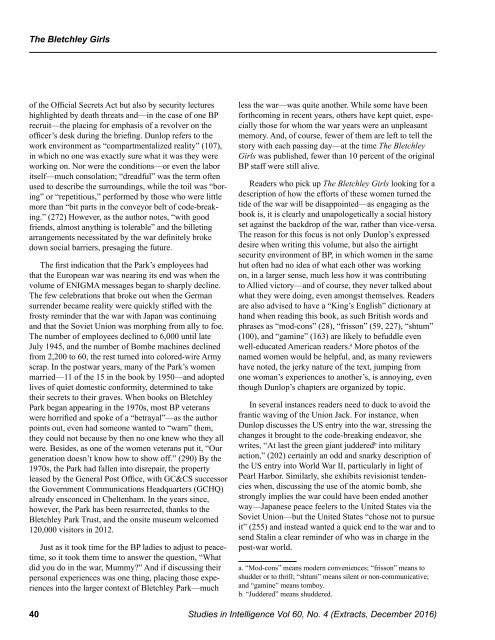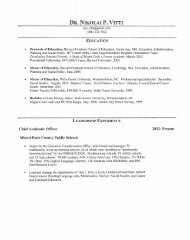extracts-studies-dec-2016
extracts-studies-dec-2016
extracts-studies-dec-2016
You also want an ePaper? Increase the reach of your titles
YUMPU automatically turns print PDFs into web optimized ePapers that Google loves.
<br />
The Bletchley Girls<br />
of the Official Secrets Act but also by security lectures<br />
highlighted by death threats and—in the case of one BP<br />
recruit—the placing for emphasis of a revolver on the<br />
officer’s desk during the briefing. Dunlop refers to the<br />
work environment as “compartmentalized reality” (107),<br />
in which no one was exactly sure what it was they were<br />
working on. Nor were the conditions—or even the labor<br />
itself—much consolation; “dreadful” was the term often<br />
used to describe the surroundings, while the toil was “boring”<br />
or “repetitious,” performed by those who were little<br />
more than “bit parts in the conveyor belt of code-breaking.”<br />
(272) However, as the author notes, “with good<br />
friends, almost anything is tolerable” and the billeting<br />
arrangements necessitated by the war definitely broke<br />
down social barriers, presaging the future.<br />
The first indication that the Park’s employees had<br />
that the European war was nearing its end was when the<br />
volume of ENIGMA messages began to sharply <strong>dec</strong>line.<br />
The few celebrations that broke out when the German<br />
surrender became reality were quickly stifled with the<br />
frosty reminder that the war with Japan was continuing<br />
and that the Soviet Union was morphing from ally to foe.<br />
The number of employees <strong>dec</strong>lined to 6,000 until late<br />
July 1945, and the number of Bombe machines <strong>dec</strong>lined<br />
from 2,200 to 60, the rest turned into colored-wire Army<br />
scrap. In the postwar years, many of the Park’s women<br />
married—11 of the 15 in the book by 1950—and adopted<br />
lives of quiet domestic conformity, determined to take<br />
their secrets to their graves. When books on Bletchley<br />
Park began appearing in the 1970s, most BP veterans<br />
were horrified and spoke of a “betrayal”—as the author<br />
points out, even had someone wanted to “warn” them,<br />
they could not because by then no one knew who they all<br />
were. Besides, as one of the women veterans put it, “Our<br />
generation doesn’t know how to show off.” (290) By the<br />
1970s, the Park had fallen into disrepair, the property<br />
leased by the General Post Office, with GC&CS successor<br />
the Government Communications Headquarters (GCHQ)<br />
already ensconced in Cheltenham. In the years since,<br />
however, the Park has been resurrected, thanks to the<br />
Bletchley Park Trust, and the onsite museum welcomed<br />
120,000 visitors in 2012.<br />
Just as it took time for the BP ladies to adjust to peacetime,<br />
so it took them time to answer the question, “What<br />
did you do in the war, Mummy?” And if discussing their<br />
personal experiences was one thing, placing those experiences<br />
into the larger context of Bletchley Park—much<br />
less the war—was quite another. While some have been<br />
forthcoming in recent years, others have kept quiet, especially<br />
those for whom the war years were an unpleasant<br />
memory. And, of course, fewer of them are left to tell the<br />
story with each passing day—at the time The Bletchley<br />
Girls was published, fewer than 10 percent of the original<br />
BP staff were still alive.<br />
Readers who pick up The Bletchley Girls looking for a<br />
description of how the efforts of these women turned the<br />
tide of the war will be disappointed—as engaging as the<br />
book is, it is clearly and unapologetically a social history<br />
set against the backdrop of the war, rather than vice-versa.<br />
The reason for this focus is not only Dunlop’s expressed<br />
desire when writing this volume, but also the airtight<br />
security environment of BP, in which women in the same<br />
hut often had no idea of what each other was working<br />
on, in a larger sense, much less how it was contributing<br />
to Allied victory—and of course, they never talked about<br />
what they were doing, even amongst themselves. Readers<br />
are also advised to have a “King’s English” dictionary at<br />
hand when reading this book, as such British words and<br />
phrases as “mod-cons” (28), “frisson” (59, 227), “shtum”<br />
(100), and “gamine” (163) are likely to befuddle even<br />
well-educated American readers. a More photos of the<br />
named women would be helpful, and, as many reviewers<br />
have noted, the jerky nature of the text, jumping from<br />
one woman’s experiences to another’s, is annoying, even<br />
though Dunlop’s chapters are organized by topic.<br />
In several instances readers need to duck to avoid the<br />
frantic waving of the Union Jack. For instance, when<br />
Dunlop discusses the US entry into the war, stressing the<br />
changes it brought to the code-breaking endeavor, she<br />
writes, “At last the green giant juddered b into military<br />
action,” (202) certainly an odd and snarky description of<br />
the US entry into World War II, particularly in light of<br />
Pearl Harbor. Similarly, she exhibits revisionist tendencies<br />
when, discussing the use of the atomic bomb, she<br />
strongly implies the war could have been ended another<br />
way—Japanese peace feelers to the United States via the<br />
Soviet Union—but the United States “chose not to pursue<br />
it” (255) and instead wanted a quick end to the war and to<br />
send Stalin a clear reminder of who was in charge in the<br />
post-war world.<br />
a. “Mod-cons” means modern conveniences; “frisson” means to<br />
shudder or to thrill; “shtum” means silent or non-communicative;<br />
and “gamine” means tomboy.<br />
b. “Juddered” means shuddered.<br />
40 Studies in Intelligence Vol 60, No. 4 (Extracts, December <strong>2016</strong>)




